It was not in my nature to be an assertive person. I was used to looking to others for guidance, for influence, sometimes for the most basic cues of life. And yet writing stories is one of the most assertive things a person can do. Fiction is an act of willfulness, a deliberate effort to reconceive, to rearrange, to reconstitute nothing short of reality itself. Even among the most reluctant and doubtful of writers, this willfulness must emerge. Being a writer means taking the leap from listening to saying, “Listen to me.”― Jhumpa Lahiri
August is a month of literary significance as it marks Women in Translation Month, a time dedicated to recognizing and appreciating the contributions of women translators and authors from around the world. This global celebration not only highlights the incredible talent of women in the field of translation but also emphasizes the importance of diversity and cultural exchange in literature. In this blog post, we delve into the significance of Women in Translation Month, its origins, and the impact of women translators on the literary landscape.
The Origins of Women in Translation Month
Women in Translation Month, aka #WIT, was initiated by Meytal Radzinski in 2014 as a response to the glaring gender imbalance in translated literature. The month-long event aims to promote and increase the visibility of women authors and translators in an industry historically dominated by male voices. The celebration has gained immense traction over the years, bringing attention to the wealth of diverse stories that might otherwise go unnoticed.
Amplifying Diverse Voices
Women in Translation Month is an opportunity to explore literature beyond one's own culture and language. It encourages readers to discover narratives, perspectives, and experiences that might be vastly different from their own. Women authors and translators bring unique viewpoints to the table, enriching the global literary landscape with stories that touch upon a wide range of themes, emotions, and social issues.
Spotlight on Influential Women Translators
This month provides a platform to honor the remarkable contributions of women translators who have bridged the gap between languages and cultures. From Edith Grossman, who introduced Gabriel García Márquez's magic realism to English readers, to Ann Goldstein, known for her translations of Elena Ferrante's Neapolitan novels, these women have played a crucial role in bringing international literature to a wider audience.
Exploring Untranslated Gems
Women in Translation Month is an invitation to explore literature that might have remained undiscovered without the dedication of skilled translators. Works by women authors from non-English-speaking countries have the opportunity to shine, and readers can delve into a treasure trove of novels, poems, and essays that offer fresh insights and perspectives.
The Intersection of Feminism and Translation
Translation is inherently an act of interpretation, and women translators often bring a nuanced understanding of gender dynamics and cultural nuances to their work. This intersection of feminism and translation is a powerful force, as it allows for the translation of works that challenge traditional norms and offer a space for marginalized voices to be heard.
Women in Translation Reading List:
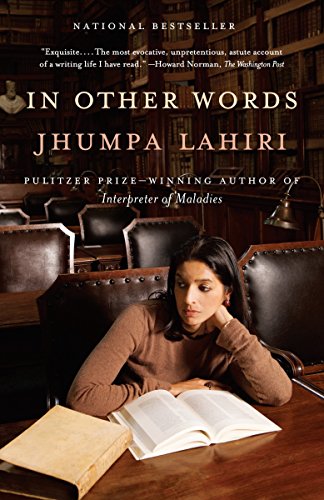
In Other Words by Jhumpa Lahiri
On a post-college visit to Florence, Pulitzer Prize-winning author Jhumpa Lahiri fell in love with the Italian language. Twenty years later, seeking total immersion, she and her family relocated to Rome, where she began to read and write solely in her adopted tongue. A startling act of self-reflection, In Other Words is Lahiri's meditation on the process of learning to express herself in another language--and the stunning journey of a writer seeking a new voice.

The Story of My Teeth by Valeria Luiselli
"Luiselli follows in the imaginative tradition of writers like Borges and Márquez, but her style and concerns are unmistakably her own. This deeply playful novel is about the passion and obsession of collecting, the nature of storytelling, the value of objects, and the complicated bonds of family. . . Luiselli has become a writer to watch, in part because it's truly hard to know (but exciting to wonder about) where she will go next."--The New York Times
I was born in Pachuca, the Beautiful Windy City, with four premature teeth and my body completely covered in a very fine coat of fuzz. But I'm grateful for that inauspicious start because ugliness, as my other uncle, Eurípides López Sánchez, was given to saying, is character forming. Highway is a late-in-life world traveler, yarn spinner, collector, and legendary auctioneer. His most precious possessions are the teeth of the notorious infamous like Plato, Petrarch, and Virginia Woolf. Written in collaboration with the workers at a Jumex juice factory, Teeth is an elegant, witty, exhilarating romp through the industrial suburbs of Mexico City and Luiselli's own literary influences.
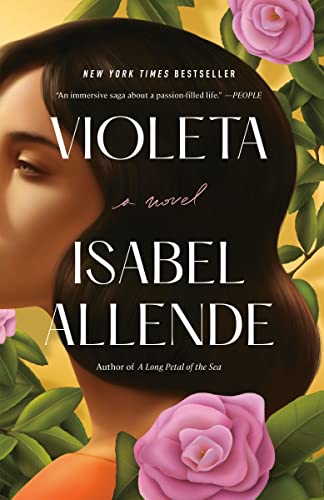
An epic story of Violeta Del Valle, a woman whose life spans one hundred years and bears witness to the greatest upheavals of the twentieth century.
Violeta comes into the world on a stormy day in 1920, the first girl in a family with five boisterous sons. From the start, her life is marked by extraordinary events, for the ripples of the Great War are still being felt, even as the Spanish flu arrives on the shores of her South American homeland almost at the moment of her birth. Through her father's prescience, the family will come through that crisis unscathed, only to face a new one as the Great Depression transforms the genteel city life she has known. Her family loses everything and is forced to retreat to a wild and beautiful but remote part of the country. There, she will come of age, and her first suitor will come calling. She tells her story in the form of a letter to someone she loves above all others, recounting times of devastating heartbreak and passionate affairs, poverty and wealth, terrible loss, and immense joy. Her life is shaped by some of the most important events of history: the fight for women's rights, the rise and fall of tyrants, and ultimately not one, but two pandemics. Through the eyes of a woman whose unforgettable passion, determination, and sense of humor carry her through a lifetime of upheaval, Isabel Allende once more brings us an epic that is both fiercely inspiring and deeply emotional.

Ms. Yoshimoto's writing is lucid, earnest and disarming. ... [It] seizes hold of the reader's sympathy and refuses to let go. -Michiko Kakutani, The New York Times
With the publication of Kitchen, the dazzling English-language debut that is still her best-loved book, the literary world realized that Yoshimoto was a young writer of enduring talent whose work has quickly earned a place among the best of contemporary Japanese literature. Kitchen is an enchantingly original book that juxtaposes two tales about mothers, love, tragedy, and the power of the kitchen and home in the lives of a pair of free-spirited young women in contemporary Japan. Mikage, the heroine, is an orphan raised by her grandmother, who has passed away. Grieving, Mikage is taken in by her friend Yoichi and his mother (who is really his cross-dressing father) Eriko. As the three of them form an improvised family that soon weathers its own tragic losses, Yoshimoto spins a lovely, evocative tale with the kitchen and the comforts of home at its heart. In a whimsical style that recalls the early Marguerite Duras, Kitchen and its companion story, Moonlight Shadow, are elegant tales whose seeming simplicity is the ruse of a very special writer whose voice echoes in the mind and the soul.
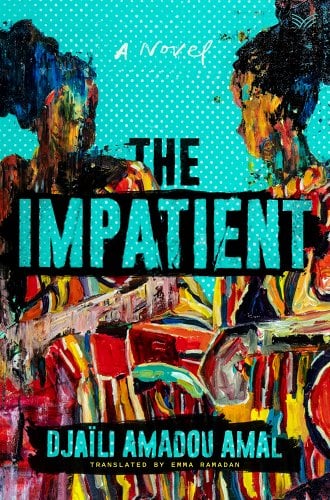
The Impatient by Djaili Amadou Amal
A powerful, heartrending, and insightful novel of a trio of women in Cameroon who dare to rebel against oppressive, long-held cultural traditions--including polygamy and domestic abuse--that define and limit their lives.
In North Cameroon, well-to-do young Ramla is torn from her true love and wed to a manipulative older man. Safira, her co-wife, juggles envy and empathy for this new bride with disappointment in the husband she desperately loves. Like her older sister, Ramla, Hindou is married off to a man she does not know or want, a distant cousin whose instability and violence terrifies her.
From an early age, these women were raised to submit to men, or risk shame and repudiation of themselves and their families. They are advised to have munyal--patience. They are told that their fates are the will of the All-Powerful, and that it is unthinkable--or rather, impossible--to defy tradition. They are reminded of the Fulani proverb which holds, "At the end of patience, there is the sky."
Yet Ramla, Safira, and Hindou are tired of waiting for a happiness that may never come. Their lives are driven by impatience and clouded by the suffering rooted in forced marriage and physical abuse, but it is this oppressive culture that binds them together. In a society that demands female obedience, how will these three impatient women free themselves?
Djaïli Amadou Amal makes her literary debut in English with this remarkable novel that breaks taboos as it denounces the cultural mores of Africa's Sahel region. Inspired by the author's own experiences and written with grace, strength, and veracity, The Impatient is a moving testimony to a shared pain and a call for change--an unflinching depiction of the psychic damage traditions can have on the women who must abide by them and a denunciation of violence against all women and the normalization of domestic abuse--not only in Cameroon but around the globe. Translated from the French by Emma Ramadan.
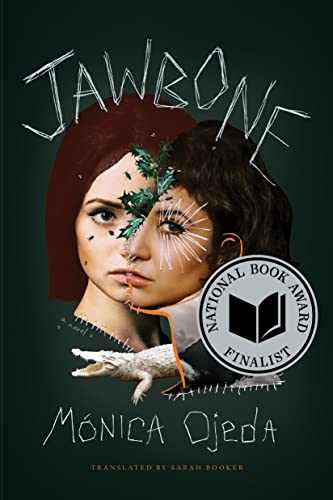
Finalist for the 2022 National Book Award in Translated Literature
Fernanda and Annelise are so close they are practically sisters: a double image, inseparable. So how does Fernanda end up bound on the floor of a deserted cabin, held hostage by one of her teachers and estranged from Annelise?
When Fernanda, Annelise, and their friends from the Delta Bilingual Academy convene after school, Annelise leads them in thrilling but increasingly dangerous rituals to a rhinestoned, Dior-scented, drag-queen god of her own invention. Even more perilous is the secret Annelise and Fernanda share, rooted in a dare in which violence meets love. Meanwhile, their literature teacher Miss Clara, who is obsessed with imitating her dead mother, struggles to preserve her deteriorating sanity. Each day she edges nearer to a total break with reality. Interweaving pop culture references and horror concepts drawn from Herman Melville, H. P. Lovecraft, and anonymous "creepypastas," Jawbone is an ominous, multivocal novel that explores the terror inherent in the pure potentiality of adolescence and the fine line between desire and fea
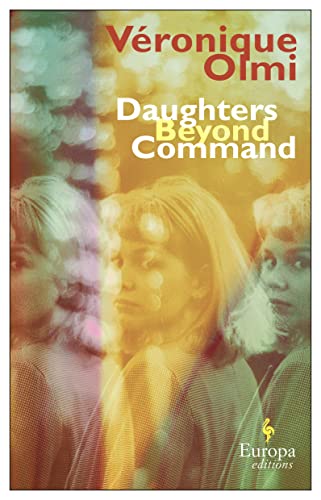
Daughters Beyond Command by Véronique Olmi
An absorbing bildungsroman that tells the story of three sisters during a decade of radical societal transformation.
Three sisters were born into a modest Catholic family in Aix-en-Provence. Sabine, the eldest, dreams of an artist's life in Paris; Hélène, the middle girl, grows up divided between the bourgeois environment of Neuilly-sur-Seine and the simple life led by her parents; Mariette, the youngest, learns the secrets and silences of a dazzling and crazy world. In 1970, French society is changing. Women have emancipated themselves whilst men have lost their bearings, and the three sisters, each in their own way, find ways to live a life of their own--a strong life, far from the morality, education, and the religion of their childhood.
This family chronicle, which takes us from the May 1968 protests to the 1981 elections, is as much a tender and tragic stroll through the 20th century as it is the chronicle of an era, where consciousnesses are awakening to the upheaval of the world, and heralding the chaos to come.
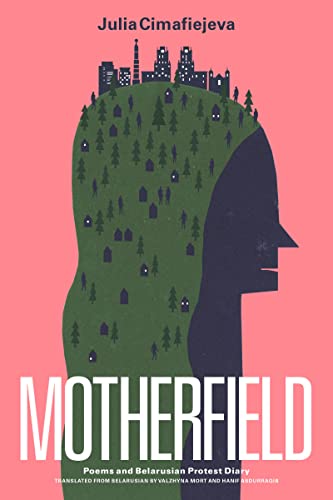
Motherfield by Julia Cimafiejeva
A poetry collection where personal is inevitably political and ecological, Motherfield is a poet's insistence on self-determination in authoritarian, patriarchal Belarus.
Julia Cimafiejeva was born in an area of rural Belarus that became a Chernobyl zone when she was a child. The book opens with a poet's diary that records the course of violence unfolding in Belarus since the 2020 presidential election. It paints an intimate portrait of the poet's struggle with fear, despair, and guilt as she goes to protests, escapes police, longs for readership, learns about the detention of family and friends, and ultimately chooses life in exile.
But can she really escape the contaminated farmlands of her youth and her impure Belarusian mother tongue? Can she really escape the radiation of her motherfield? This is the first collection of Julia Cimafiejeva's poetry in English, prepared by a team of co-translators and poets Valzhyna Mort and Hanif Abdurraqib.
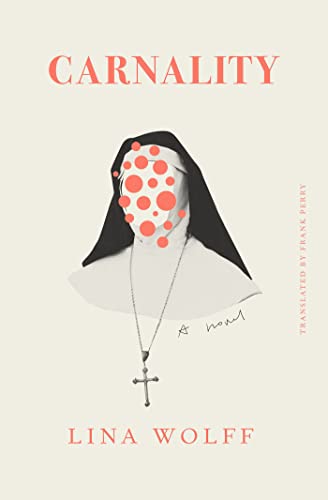
In this latest novel from the award-winning author of The Polyglot Lovers, a writer searching for inspiration in Spain goes on a darkly comic, delightfully absurd journey through an underground society.
Awarded a three-month stipend to travel and work, a Swedish writer flies to Madrid, where in a bar she meets a man with an extraordinary story to tell. In exchange for somewhere to sleep and to hide out for a few days, he is willing to tell her the whole astonishing tale. What follows is an account of fantastic proportions and ingredients: the existence of a shadowy Internet TV show with a certain morality clause, a threat to the storyteller's life, a diabolical nun, and the story of a girl with a missing left thumb. The tale is also the precursor to a meeting between the writer and the infernal miracle worker, Lucia--a meeting that ultimately forces the writer to make a fateful decision about her own inner essence. Carnality is a novel about the universal need for spirituality and truth--not to mention a good story--set in the seemingly unspiritual grimy underbelly of society.

Too Much of Life by Clarice Lispector
In the magnificent feast of Clarice Lispector’s books, her crônicas―short, intensely vivid newspaper pieces―are the delicious canapés
The crônica, a literary genre peculiar to Brazilian newspapers, allows writers (or even soccer stars) to address a wide readership on any theme they like. Chatty, mystical, intimate, flirtatious, and revelatory, Clarice Lispector’s pieces for the Saturday edition of Rio’s leading paper, the Jornal do Brasil, from 1967 to 1973, take the forms of memories, essays, aphorisms, and serialized stories. Endlessly delightful, her insights make one sit up and think, whether about children or social ills or pets or society women or the business of writing or love. This new, large, and beautifully translated volume, Too Much of Life: The Complete Crônicas presents a new aspect of the great writer―at once off the cuff and spot on.
Supporting Women in Translation
Participating in Women in Translation Month goes beyond reading translated works. It involves supporting women authors and translators by purchasing their books, attending literary events, and engaging in discussions about the importance of representation in literature. By doing so, we contribute to the ongoing effort to break down barriers and promote inclusivity. Let this annual literary event serve as a reminder of the vital role that women authors and translators play in shaping our understanding of the world through literature. By embracing translated works by women, we open ourselves up to a universe of diverse stories that enrich our perspectives and expand our horizons. Let us celebrate and amplify the voices of women in translation not just in August, but throughout the year, fostering a deeper appreciation for the global literary tapestry they weave.
Book Clubs reading international authors and/or books in languages other than English:
If you enjoyed this feature,subscribe to our blog and create a Bookclubs account to access more reading, discussion guides, and club inspiration! Already have an account? Rate and review books that you've read, and recommend your favorites to a friend.

